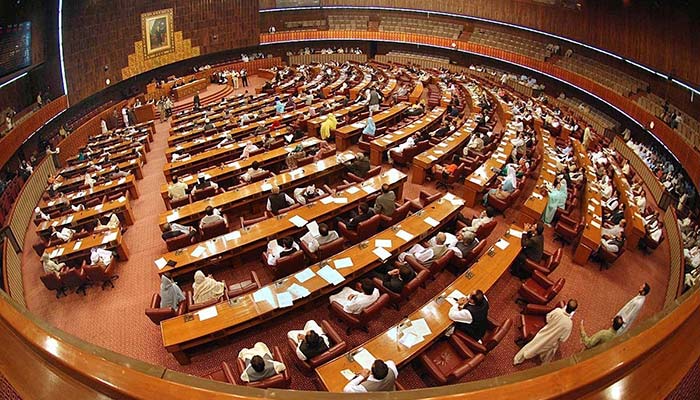
In a meeting of the cabinet, Prime Minister Imran Khan questioned a National Assembly rule that allows parliamentarians, detained in connection to money laundering and corruption charges, to be allowed to attend sessions of the lower House.
Under Assembly rules, the Speaker of the house can issue production orders for any lawmaker who may be under arrest.
Rule 108
"Production of member in custody for a sitting of the Assembly or meeting of Committee.-
(1) The Speaker or Chairman of a Committee may summon a member in custody on the charge of a non- bailable offence to attend a sitting or sittings of the Assembly or meeting of a Committee of which he is a member, if he considers his presence necessary.
(2) On a Production Order, signed by the Secretary or by any other officer authorised in this behalf, addressed to the Government of the Province where the member is held in custody, or to the authority concerned, the Provincial Government or such authority shall cause the member in custody to be produced before the Sergeant-at-Arms, who shall, after the conclusion of the sitting or the meeting, deliver the member into the custody of the Provincial Government or other authority concerned."
Parliamentarians who have often availed this right include Asif Ali Zardari of the Pakistan People's Party (PPP) and Khawaja Saad Rafique of the Pakistan Muslim League-Nawaz (PML-N). Other lawmakers in provincial assemblies are also granted production orders.
But what is the procedure for revisiting and amending a National Assembly rule?
According to Rule 293 of the Rules of Procedure and Conduct of Business in the National Assembly, if a parliamentarian wishes to amend a rule of the House, he/she must submit a notice with a proposal to the secretary of the House. The secretary will then circulate the notice among the 342 members in the parliament.
In the following days, the speaker will read out the proposed amendment to the assembly and ask those who are in favor and those who are against to rise in their seats. If the majority vote for the amendment, then it will be forwarded to the House Committee on Rules of Procedure and Privileges, after which it will be referred back and shall come into force at once.
Since the PTI has the majority in the National Assembly, with the help of its allied parties, it is unlikely to have any trouble revoking the rule of production orders.




0 Comments